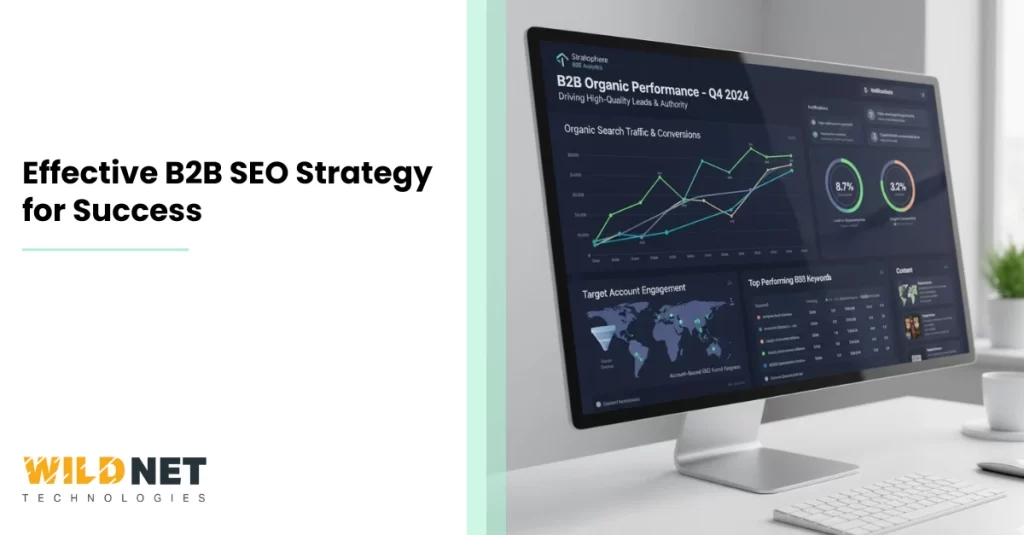A strong online presence is crucial for B2B companies in the digital age. Search engine optimization (SEO) plays a vital role in achieving this.
A well-crafted B2B SEO strategy can significantly enhance visibility and drive business growth. However, B2B SEO is not the same as B2C SEO.
Sales cycles are longer, and more decision-makers are involved. Understanding the nuances of B2B SEO is essential.
Effective B2B SEO strategies require a deep understanding of your target audience. Knowing their search intent is key to success.
Keyword research should focus on industry-specific terms and long-tail keywords. These are more likely to attract the right audience.
High-quality content is another cornerstone of a successful B2B SEO strategy. It should be informative and engaging to capture attention.
Technical SEO aspects, like site speed and mobile-friendliness, are also critical. They ensure a seamless user experience.
In this guide, we will explore effective B2B SEO strategies for success. Let’s dive in.
Understanding B2B SEO: Key Differences from B2C
B2B SEO and B2C SEO might seem similar, but they have distinct differences. Recognizing these differences is essential for crafting effective strategies.
One primary difference lies in the target audience. In B2B, you target companies, not individual consumers. This means addressing multiple decision-makers.
The sales cycle in B2B is typically longer and more complex. Patience and strategic planning are crucial for success.
Here are key differences to consider:
- Decision-Makers: Many people are involved in B2B decisions, unlike B2C, where an individual decides.
- Sales Cycle: B2B cycles take longer due to in-depth research and higher stakes.
- Content Type: B2B content is often technical and educational, focusing on expertise.
In B2B, relationships are critical. Building trust and credibility with your audience takes precedence.
Search intent also differs. B2B users often perform comprehensive research before making decisions.
Understanding these nuances helps tailor your B2B SEO strategy to be more effective. Knowing the unique challenges and opportunities ensures better results.
Defining Your Target Audience and Search Intent
Effective B2B SEO begins with a clear understanding of your target audience. Knowing who your potential clients are is crucial for success.
Audience identification requires thorough research. Identify industries, company sizes, and key decision-makers benefitting from your products.
Comprehending their needs and challenges is essential. This understanding allows you to create content that addresses their specific issues.
Search intent plays a crucial role in this process. People search for solutions based on their stage in the buying journey.
Consider these search intent types:
- Informational: Seeking knowledge to solve a problem.
- Navigational: Looking for a particular website.
- Transactional: Ready to make a purchase or hire a service.
Tailor your content to match these search intents. Offering valuable insights and solutions strengthens your connection with potential clients.
Accurate audience targeting leads to higher engagement and conversions and crafting content that resonates with their needs positions you as a trusted advisor.
Comprehensive Keyword Research for B2B
Keyword research is the backbone of any effective B2B SEO strategy. It helps ensure your content reaches the right audience.
Begin with a list of industry-specific terms related to your business. Use tools like Google Keyword Planner or SEMrush to expand and refine this list.
Focusing on long-tail keywords, phrases with three or more words that indicate specific search intent, can be a game-changer.
Long-tail keywords often face lower competition. This makes them ideal for targeting niche audiences in the B2B space.
Use a mix of keyword types to cover various search intents—balance general industry terms with specific product or service keywords.
Here’s how to structure your keyword research process:
- Identify Core Keywords: Terms fundamental to your industry.
- Explore Variations: Synonyms and related phrases.
- Analyze Competitor Keywords: Glean insights from successful peers.
- Discover Long-Tail Opportunities: Capture specific search intent with detailed phrases.
Comprehensive research highlights the language your audience uses. This knowledge aids in crafting content that aligns with their searches. This alignment is key to boosting visibility and engagement.
Creating High-Quality, Authoritative Content
High-quality content is crucial in a B2B SEO strategy. It establishes your business as a thought leader in your field.
Content should be informative, addressing the needs and queries of your audience. This approach satisfies search engines and builds trust with potential clients.
Authoritative content often includes detailed guides, how-tos, and industry analyses. These forms of content demonstrate your expertise and understanding.
Providing original insights adds value. It distinguishes your content from others and can lead to higher search rankings.
Visual elements such as infographics or videos can also enhance content appeal. They improve user engagement and convey complex information efficiently.
To ensure your content remains authoritative and engaging, focus on:
- Research and Fact-Check: Support claims with credible data.
- Maintain Clarity: Use concise language and avoid jargon.
- Engage Experts: Include expert quotes or interviews.
- Update Regularly: Keep information current to stay relevant.
Effective content improves SEO performance and encourages shares across platforms, amplifying reach. This combination of quality and strategy drives both visibility and authority online.
On-Page SEO Best Practices for B2B Websites
On-page SEO is crucial for optimizing B2B websites. Proper implementation enhances both user experience and search engine visibility.
Start by optimizing title tags and meta descriptions. These elements should convey the content’s essence and include target keywords.
Headers organize content, making it easier to read and understand. Use H1, H2, and H3 tags to structure your information logically.
Alt text is essential for images. It should describe the image accurately and include keywords if relevant, without overstuffing.
A well-structured URL should be straightforward and keyword-rich. It helps search engines comprehend the page context while assisting user navigation.
Consider these on-page SEO tips:
- Use Descriptive URLs: Keep them short and relevant.
- Internal Linking: Connect related content to enhance navigation.
- Responsive Design: Ensure your site is mobile-friendly.
- User Engagement: Include CTAs to guide user actions.
Focusing on these practices can significantly improve your B2B website’s search performance. Strong on-page SEO creates a solid foundation for more advanced strategies.
Technical SEO: Building a Strong Foundation
Technical SEO is vital for ensuring your B2B website functions smoothly. It sets the groundwork for a high-performing site and impacts search rankings.
Focus on optimizing site speed. Fast-loading pages enhance user experience and improve search engine rankings. Slow sites frustrate users and lead to higher bounce rates.
Ensure your website is mobile-friendly. More B2B searches happen on mobile devices than ever before, and a responsive design caters to all users, regardless of their device.
Secure connections are essential. Implement HTTPS to protect data and build trust with visitors. Google also considers HTTPS a ranking factor.
Robots.txt and XML sitemaps guide search engines. Use them effectively to ensure proper indexing of all crucial pages.
Key technical SEO components include:
- Site Speed: Use tools to monitor and optimize.
- Mobile-Friendliness: Ensure usability across devices.
- Secure HTTPS: Protect and validate your site.
- Proper Indexing: Utilize sitemaps and robots.txt.
These practices create a robust technical foundation and ensure your B2B site is accessible, secure, and efficient.
Link Building and Digital PR for B2B
Link building enhances credibility and boosts search engine rankings. It’s essential for a successful B2B SEO strategy. Unlike B2C businesses, B2B companies focus on authority and thought leadership.
Target industry-specific sites for backlinks. Building relationships with reputable sources in your niche strengthens your brand’s reputation.
Digital PR is an effective tool. Collaborate with online publications to share your insights and achievements. This not only increases visibility but also generates valuable backlinks.
Consider guest blogging on industry-related websites. It positions your brand as an expert and attracts potential clients to your site.
Monitor your link profile regularly. Ensure the backlinks are from trustworthy and relevant sources to maintain authority.
Key link-building strategies include:
- Industry-Specific Backlinks: Focus on niche sites.
- Digital PR: Engage with online publications.
- Guest Blogging: Showcase expertise.
- Regular Monitoring: Maintain a strong link profile.
These strategies integrate well into a B2B SEO approach, enhancing authority and driving high-quality traffic.
Leveraging Content Marketing: Whitepapers, Case Studies, and More
Content marketing is pivotal in B2B SEO strategies. It helps establish authority and build trust. High-quality, informative content attracts and engages the target audience.
Whitepapers are invaluable for in-depth exploration of complex topics. They position your business as a thought leader and provide readers with actionable insights and solutions.
Case studies showcase real-world success. They offer proof of your product or service’s effectiveness. Prospective clients find case studies particularly persuasive.
Blogs, eBooks, and webinars complement other content types. They cater to different audience preferences and learning styles. This diversity amplifies your reach.
Consistently updating and repurposing content keeps it relevant. It also boosts SEO performance by maintaining audience engagement.
Key content marketing strategies include:
- Whitepapers: Detail complex topics.
- Case Studies: Validate effectiveness.
- Blogs, eBooks, Webinars: Diversify content.
- Consistent Updates: Keep content fresh.
Integrating these strategies with your B2B SEO plan will elevate your brand’s online presence and engagement.
Amplifying Reach with Social Media and Influencer Collaboration
Social media is a powerful tool for extending your B2B content reach. It helps engage directly with your audience. This interaction builds relationships and fosters brand loyalty.
Influencers add another dimension to your strategy. They possess authority in your industry. Their endorsement can significantly boost your credibility.
Collaboration with these influencers introduces your brand to new audiences. It elevates your visibility in the market. This strategy leverages established trust and rapport.
Consider these tactics for a robust approach:
- Identify Relevant Influencers: Align them with your brand values.
- Engage on Multiple Platforms: Choose platforms where your audience is active.
- Create Shareable Content: Encourage influencers to promote it.
- Foster Long-Term Partnerships: Build enduring relationships for sustained impact.
This coordinated effort between social media and influencers amplifies your B2B SEO strategy’s effectiveness.
Local SEO and Voice Search Optimization for B2B
Local SEO is essential for B2B companies targeting specific areas. It ensures visibility for businesses seeking local clients. Optimizing local listings can drive targeted traffic.
Voice search has grown rapidly with smart speakers. It changes how users search online. B2B firms should consider this when crafting SEO strategies.
To capitalize on local SEO and voice search, implement these steps:
- Optimize for “Near Me” Searches: Include geographic keywords.
- Claim and Update Local Listings: Ensure all information is accurate.
- Use Conversational Language: Tailor content to natural speech patterns.
Integrating these aspects will enhance your B2B SEO strategy, ensuring broader reach and relevance.
Measuring Success: Analytics, Tracking, and Continuous Improvement
Monitoring SEO performance is crucial for B2B success. Analytics tools provide valuable insights into user behavior. These insights guide strategic adjustments and enhancements.
Regular tracking identifies areas for improvement, helping to focus efforts effectively. Continuous improvement drives long-term SEO success.
To measure success effectively, consider:
- Set Clear Goals: Define what success looks like for your business.
- Use Analytics Tools: Leverage tools like Google Analytics for data insights.
- Monitor KPI’s: Track metrics like traffic, conversions, and bounce rates.
Evaluating and adapting your B2B SEO strategy ensures a competitive advantage. For optimal outcomes, keep strategies aligned with evolving business goals.
Integrating SEO with Your Digital Marketing Strategy
Integrating SEO into your digital marketing strategy ensures cohesive branding. SEO boosts visibility and supports other marketing channels. Every piece of content should align with your SEO goals.
A unified approach enhances overall marketing effectiveness. Each strategy amplifies the other’s impact. This synergy drives better results for your business.
For successful integration, consider the following steps:
- Align Objectives: Ensure SEO goals match digital marketing aims.
- Coordinate Teams: Encourage collaboration between SEO and marketing teams.
- Utilize Content: Use SEO principles in every piece of marketing content.
An integrated strategy maximizes resources and leverages marketing opportunities. It establishes a stronger online presence and aligns efforts, leading to sustainable success in digital marketing.
Common B2B SEO Mistakes to Avoid
Avoiding common SEO mistakes is crucial for success. Mistakes can hinder your site’s performance. Recognizing pitfalls allows your strategies to thrive.
Common mistakes in B2B SEO include:
- Ignoring Technical SEO: Overlooking site speed and mobile-friendliness.
- Poor Keyword Targeting: Failing to use industry-specific terms.
- Neglecting Content Quality: Publishing low-value content reduces credibility.
Addressing these errors improves your search performance. Continuous learning and adaptation keep strategies effective. Focus on long-term growth rather than quick fixes.
Conclusion: Building a Sustainable B2B SEO Strategy
Creating a successful B2B SEO strategy requires careful planning and execution. Various elements, such as keyword research and content creation, must be considered. Each component plays a vital role in your strategy’s success.
Regular updates and continuous monitoring help maintain your SEO effectiveness. Stay informed about industry changes so that you can adapt promptly. This proactive approach ensures you’re always ahead of the curve.
Integrating SEO with broader marketing goals leads to sustainable growth. A well-rounded strategy aligns with your business objectives, maximizing overall digital success.
By implementing strategies like these, businesses can unlock new growth opportunities and stay ahead of competitors in the ever-evolving digital landscape. If you’re ready to take your online presence to the next level, our expert team is here to help. As a trusted SEO services and digital marketing company, we specialize in driving measurable results, improving rankings, and maximizing ROI—partner with us today to transform your visibility and turn search traffic into lasting business success.
1. What is B2B SEO, and how is it different from B2C SEO?
B2B SEO focuses on optimizing websites to attract decision-makers from other businesses. It often targets niche industries and longer sales cycles, while B2C SEO usually focuses on broader audiences with faster purchase decisions.
2. Why is keyword research necessary in B2B SEO?
In B2B SEO, keyword research helps identify high-intent, industry-specific terms decision-makers search for. These keywords often have lower search volume but higher value for conversions.
3. How long does it take to see results from B2B SEO strategies?
B2B SEO is a long-term approach. Depending on competition, industry, and current website authority, it typically takes 3–6 months to start seeing measurable improvements.
4. Which SEO strategies work best for B2B companies?
Content marketing, semantic SEO, technical SEO, backlink building, and optimizing for LinkedIn or industry-specific platforms are highly effective for B2B SEO.
5. Do B2B companies need an SEO agency or can it be done in-house?
While in-house teams can handle some SEO tasks, partnering with a professional SEO services provider ensures access to advanced tools, expertise, and consistent strategies that drive better results.
Read More






